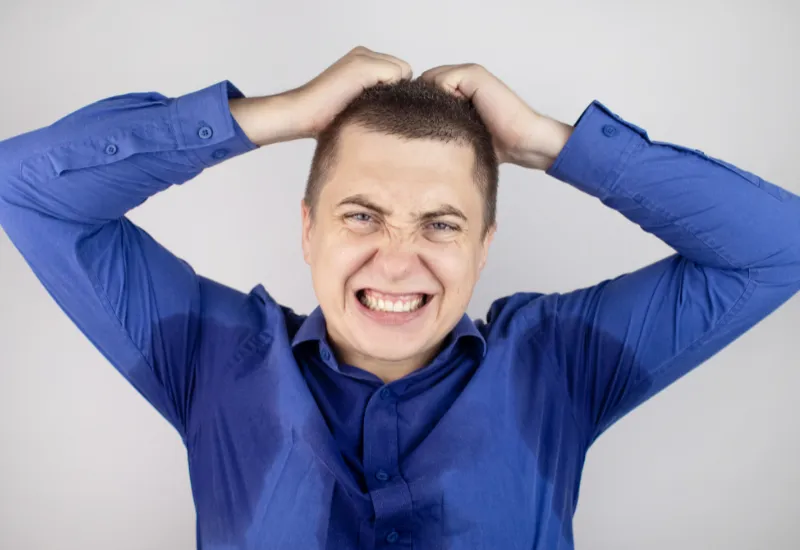You complete an exercise routine or do strenuous physical activity, and you notice your whole body drenched in sweat. That’s a regular mechanism by which your body controls temperature. But what to do if you are sweating excessively without any apparent reason? This condition is known as hyperhidrosis, and there are multiple ways to manage it.
Hyperhidrosis is not a life-threatening condition, but it can affect a person's mental health and may become a cause of embarrassment in social settings. You may isolate yourself or avoid going outside due to this reason. If you have this condition, it is beneficial to talk to your doctor about it without any hesitation. Your doctor will guide you about the necessary measures to manage this condition and avoid its psychological effects on your health.
What Causes Hyperhidrosis?
Based on the cause of origin, hyperhidrosis can be primary or secondary. Primary hyperhidrosis is one that occurs without any other apparent reason. It is not well understood. Some researchers have indicated that primary hyperhidrosis can be linked to a genetic factor. This means if you have any family history of this condition, you may be prone to it as well.
Secondary hyperhidrosis occurs due to a pre-existing condition contributing to excessive sweating. This may include obesity, hyperthyroidism, gout, anxiety, heart disease, alcohol abuse, etc. The presence of a secondary condition can disturb the normal thermoregulatory mechanism of your body, leading to excessive sweating without any physical activity or heat.
Types of Hyperhidrosis
Hyperhidrosis is classified into two types based on the areas involved with excessive sweating. This includes focal hyperhidrosis and generalized hyperhidrosis.
Focal hyperhidrosis affects specific body regions such as the palms, soles, face, underarms, or groin. For example, palmoplantar hyperhidrosis causes excessive sweating in the palms of your hands and soles of your feet.
Generalized hyperhidrosis affects your whole body. You can feel your entire body sweating even in the absence of hot weather or physical activity.
When to See a Doctor?
If you experience consistent sweating without any apparent cause, it is better to consult a doctor for this condition. Some people may feel hesitant to seek medical help because of anxiety or embarrassment, but it is nothing to be embarrassed about. Your doctor may ask for the history of your signs and symptoms and their effect on your day-to-day life. For diagnostic purposes, they may perform sweat tests to identify areas of excessive sweating. Your doctor may also need to conduct some other diagnostic tests if they suspect a secondary disease as a cause. For example, thyroid function tests (TFTs) will be necessary if hyperthyroidism is suspected.
Discuss all your signs and symptoms with your doctor to receive proper guidance on managing this condition. Lack of advice or medical help can increase the risk of psychological issues such as depression, social anxiety, etc. Hyperhidrosis may also make your skin more prone to other infections, so it is always better to consult a doctor at an early stage.
How can it be treated?
Treatment depends upon the cause of hyperhidrosis. If it is due to secondary disease, treatment options focus on curing that disease first. Hyperhidrosis that occurs for no secondary reason often requires multiple methods to manage it.
You may need to modify your clothing style to lessen sweating. Wear light, loose-fitting clothes that allow air to pass through. Clothes made from stuff like nylon or wool can increase sweating. If your underarms sweat too much, you can use armpit shields or pads to control it. Shoes and socks made of natural material are preferred if you have to wear them. Otherwise, it is recommended to wear open footwear to allow air. Take a bath whenever it is necessary to avoid skin irritation or infections.
Mild to moderate hyperhidrosis can be controlled by using antiperspirants. Antiperspirants available over-the-counter can help to a limited extent. If antiperspirants do not control your sweating or you smell a foul odor from your body, your doctor may prescribe a strong antiperspirant with aluminum chloride. Spray it on the affected body parts only and keep it away from your eyes. Prescription creams containing glycopyrrolate may also be recommended.
Some other techniques involve iontophoresis, botulinum toxin injections, the use of anticholinergic or antidepressant drugs, etc. Surgical options are also available for cases of severe hyperhidrosis where sweat glands are removed or destroyed. The appropriate technique will be decided by your doctor based on the severity of your condition.
Visit cura4u to obtain expert consultation and other quality healthcare services. Register yourself and your loved ones today!












